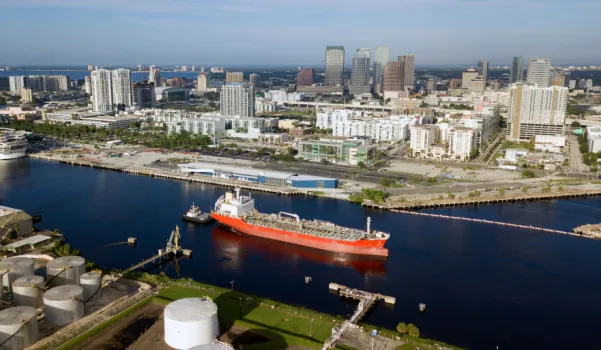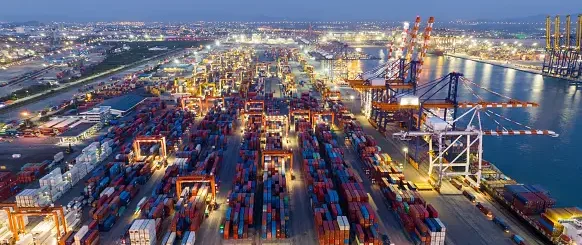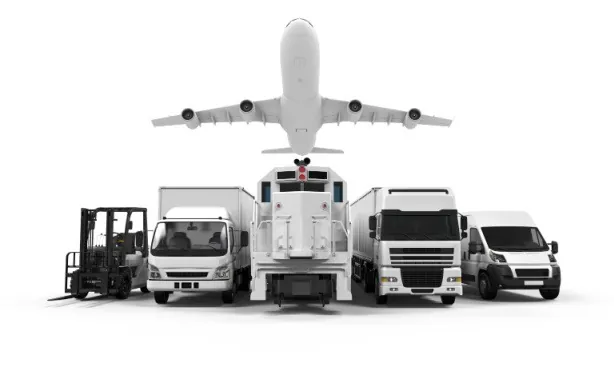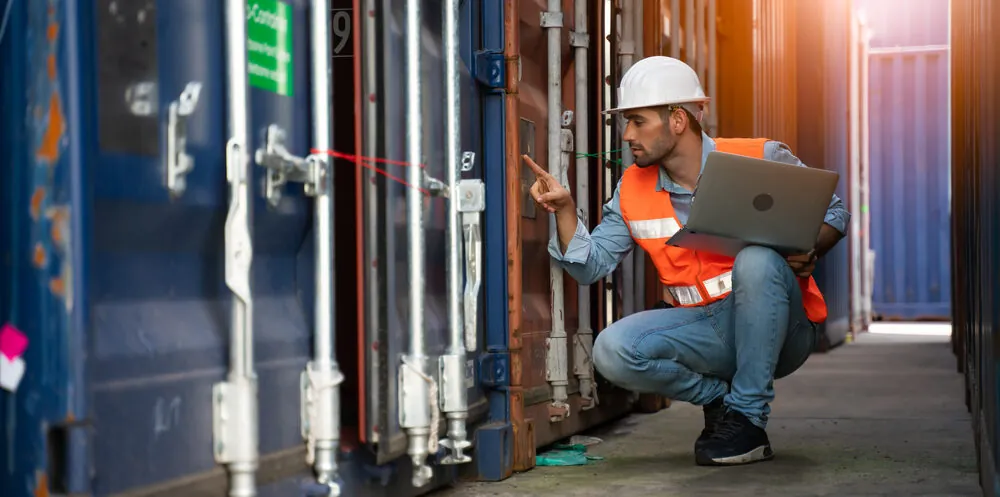
What are Different Types of Container Ports?
There are many different types of ports out there, and each with it's own purpose. This page will delve into the specifics of each port, and their purposes.

Different Types of Container Ports
Thousands of businesses trust FreightCenter to move their freight faster, smarter, and cheaper! From unbeatable rates to top-notch service, our customers are raving about their shipping success.
See why they keep coming back!
Award-Winning Service, Trusted by Shippers Everywhere!
- 2021, 2017 & 2016 Food Logistics’ Top Green Providers
- 2021 & 2018 Supply & Demand Chain Executives’ Pros to Know: Matthew Brosious
- 2020 & 2019 Top Food Logistics’ 3PL & Cold Storage Provider Award
- 2020 & 2019 Business Observer’s Top 500 Companies on the Gulf Coast
- 2020 & 2017 SmartWay® Transport Partner
- 2020 & 2017 Food Logistics’ Champions: Rock Stars of the Supply Chain
- 2020 Best of Palm Harbor Awards for Local Businesses
- 2017 Green Supply Chain Award from Supply & Demand Chain Executive
- 2017 Tampa Bay Business Journal Heroes at Work
- 2016, 2015, & 2012 Food Logistics Top 100 Software and Technology Providers
- 2013 Tampa Bay Business 100 by Tampa Bay Business Journal
- 2013 Top 100 Great Supply Chain Partners by SupplyChainBrain
- 2012 TIA Samaritan Award Honorable Mention
- 2012, 2011 & 2010 TBBJ Fast 50 Recipient
- 2013, 2011, & 2010 Diversity Business Top Businesses

Why Choose FreightCenter for Shipping?
Expertise in Freight Shipping: With over 25 years in the logistics industry, FreightCenter is dedicated to guiding you through the entire logistics process, from beginning to end. Our goal is to make freight shipping easy to understand and book. Don’t waste time researching and receiving quotes from individual carriers- FreightCenter’s got your back!
Competitive Rates with Tailored Solutions: We prioritize high-quality customer service without breaking your wallet. We utilize our relationships with regional and national carriers to offer you competitive, affordable rates for shipping while providing personalized solutions to your needs. Need a reefer trailer? We got you! Want to expedite your order? Leave it to us! We’re ready to provide tailored solutions that don’t compromise your shipment.
Personalized Customer Support: FreightCenter is committed to satisfying our customers. Our customer support team is here to help you every step of the way, from initial inquiries to post-shipment concerns. We handle all aspects of logistics, including tracking, paperwork, and communication with carriers, so you can focus on what matters while we manage your shipment. Choose us for our reliable service and affordable quotes!

Different Types of Container Ports
Transshipment Ports
These container ports serve as hubs where cargo is transferred from one vessel to another. Transshipment is often used when direct shipping routes are not available between origin and destination ports. Goods are unloaded at a transshipment port and then loaded onto another vessel that will take them to their final destination. A prime example is the Port of Singapore, which handles a significant portion of transshipment traffic globally.
Feedports
These are smaller container ports that serve as connections between transshipment ports and smaller regional locations. They handle smaller volumes of cargo, which are typically transferred to larger gateway or transshipment ports for further shipment. These ports are crucial for reaching remote or less-connected regions.
Dry Ports
Not near the coast, dry ports are inland facilities that serve as extensions of seaports. They are typically connected by rail or road and allow goods to be processed and cleared for customs away from busy coastal ports. Inland container depots (ICDs) are a form of dry port, providing logistics services such as container storage, sorting, and customs clearance.
Bulk Ports
While these container ports handle bulk cargo (liquids, grains, etc.), many have specialized facilities for containerized cargo as well. These are often used in conjunction with container ports to handle goods that are not well-suited to containerization, such as oil or coal. Many large container ports also have bulk handling capabilities to ensure comprehensive service.
Each type of container port serves a specific role in the coal logistics and shipping network, helping to streamline operations and connect different regions effectively. For more details on the functions and types of ports, you can explore logistics and maritime resources further. For more info on the containers themselves, click here.
To create value for our customers by delivering customized shipping solutions that meet their unique needs and to fulfill shipping demands from simple to complex with expertise, guidance and ingenuity.
The most reliable Specialized Freight Services rates from all the top carriers are just a few steps away. From white glove service to international shipping, we've got you covered.
Conquer borders with our international freight shipping service! From distant shores to global markets, we deliver your cargo with efficiency and reliability. Explore our seamless shipping solutions and expand your horizons with confidence!
Keep things cool with our refrigerated freight service! From farm to fork, we ensure your perishable goods stay fresh and delicious. Explore our chilly-chic shipping solutions and keep your cargo crisp, no matter the distance!
Set sail on a global adventure with our container shipping service! Seamlessly transporting your goods across oceans and continents, we offer reliable, efficient, and secure solutions for all your shipping needs. Discover the thrill of worldwide trade with our expert container shipping services today!

Frequently Asked Questions about Container Ports

Q. Why should I use a feeder port instead of a gateway port?
Feeder ports are ideal for regions or smaller cities that are not directly connected to major global shipping lanes. If you’re shipping goods to a less accessible area, feeder ports allow you to connect smaller vessels to gateway or transshipment ports. They help reduce shipping costs and time for goods moving to and from remote regions.
Q. What are the benefits of using dry ports?
Dry ports are inland terminals that offer similar services to seaport terminals, but they are located far from the coast. They allow cargo to be processed and cleared away from congested ports, offering a smoother inland transportation experience. Dry ports are connected to seaports by road or rail, and they play a key role in enhancing logistics efficiency for landlocked countries or regions.
Q. Can a bulk port handle containers?
Yes, many bulk ports also handle containerized cargo. While bulk ports specialize in non-containerized goods such as oil, coal, or grains, some have facilities to manage containerized cargo as well. However, if you are exclusively shipping containers, a dedicated container port might be more efficient
Q. How do transshipment ports impact shipping costs?
Transshipment can increase shipping costs and transit times since cargo needs to be unloaded and reloaded between ships. However, transshipment ports enable shipping companies to optimize routes, particularly in regions with limited direct shipping connections. This process helps make global trade more accessible to smaller or less-connected regions.
Q. What factors determine whether a port is used for transshipment or direct shipping?
The decision to use a transshipment port versus a direct shipping route depends on various factors, including the geographical location of the origin and destination ports, shipping costs, the size of the cargo, and the available infrastructure. Transshipment is typically used when there is no direct shipping route, when a more efficient route can be created through a transshipment hub, or when larger vessels cannot dock at smaller ports. While transshipment can add costs and time, it is essential for connecting smaller ports to major international trade routes.
3 Advantages of Shipping with FreightCenter

25+ Years in the Business
We have over 25 years of experience, as evidenced by our large network of professional carriers. Our knowledgeable team of shipping experts is ready to help you optimize your small business for the intricate world of logistics.

Personalized Shipping Options
Do you need a reefer trailer? No problem! Do you need a liftgate? We got you! FreightCenter’s user-friendly online booking allows you to customize your order.

Supreme Customer Support
FreightCenter’s professional team is on your side. We’ll guide you through every step in the shipping process, from initial quoting to post-shipment support. We prioritize customer satisfaction and ensure your needs are met 100%.


